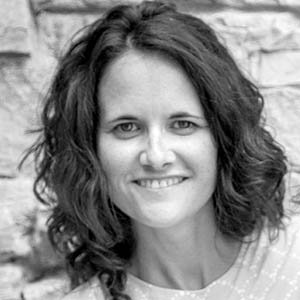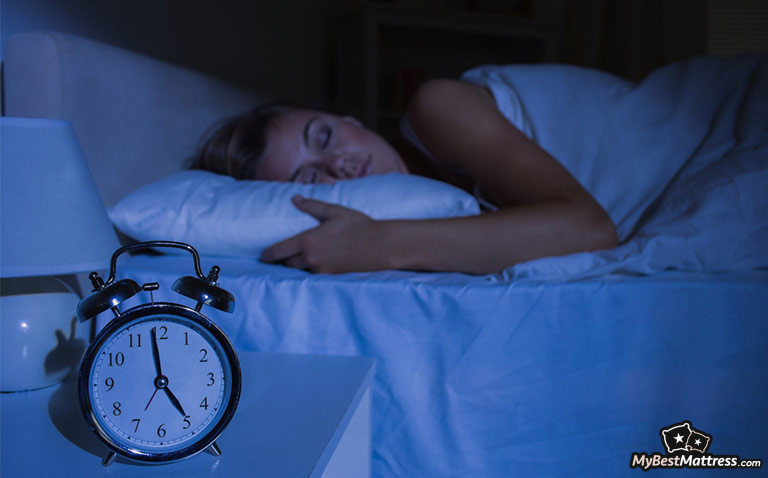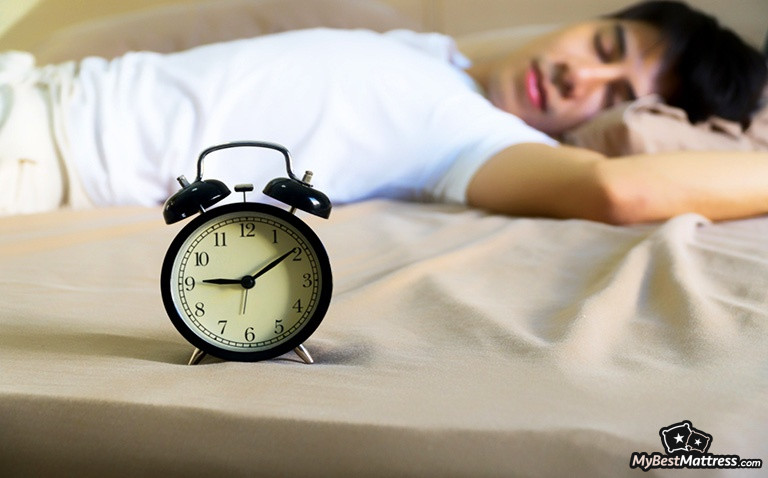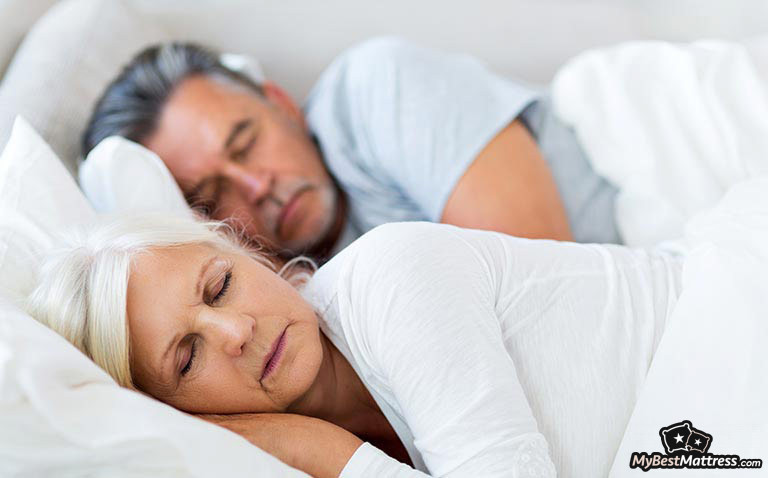
Aging and sleep are one of the most crucial topics for seniors. But why do so many people experience insomnia in elderly? After all, older people need as much sleep as any other adult, around 7 to 9 hours[1]. So what happens with aging and sleep? What kind of biological changes is responsible for this problem?
In this article, you will find everything there is to know about aging and sleep, body changes and health problems that have a significant influence on the older people sleeping habits, and how prescription medication can influence aging and sleep, and, of course, tips to help you sleep better.
Now, let's move further into the article to get all the information you’re interested in.
What changes happen in our sleep patterns when we age?
As we age, our sleep patterns change in response to the biological and hormonal transitions that occur within our bodies. It is not uncommon that as you age, you find that you sleep in shorter increments, but have a need to sleep more frequently, as the amount of sleep you need within a 24 hour period, with it being 7-9 hours for most adults, doesn’t change for much of your adult life.
Table of Contents
- 1. Aging and Sleep: Introduction
- 2. Sleep in the Elderly: What is Normal?
- 3. Major Changes in Sleep Cycle
- 4. Sleeping Disorders that are Associated with Elderly
- 4.1. Insomnia in Elderly
- 4.2. Excessive Sleep in Elderly
- 5. Can Prescription Medication Change Sleep Habits in the Elderly?
- 6. Aging and Sleep: Sleep Aids for Elderly
- 6.1. Find the Comfortable Mattress
- 6.2. Create Your Sleeping Routine
- 7. Conclusions
Aging and Sleep: Introduction
It is known that up about 50% of the elderly experience the lack of sleep[2] or so-called insomnia. Knowing that sleep is one of the major aspects of our day and older people have a variety of other health issues, it’s obvious that sleep can increase those problems and even cause accidents due to the day time drowsiness.
Since various biological changes are happening as we get older, it gets more and more challenging to get the needed amount of sleep.
So, let’s move further and talk about the biological processes that are happening in your body and what is normal in the elderly.
Sleep in the Elderly: What is Normal?
If you think that it’s not normal that your sleep patterns in the elderly age are changing, then you’re wrong. As difficult it can be to accept the truth, many biological changes are happening in our bodies. And those changes are responsible for the disruption of normal sleep patterns in the elderly.
What is more, the circadian rhythm can change the sleep-wake cycles, it also influences other major aspects of senior lives, such as digestion, body heat, and so on. But getting back to the topic, the disruption of the circadian rhythm are inevitable as we age. So you might wake up much earlier in the morning or not be able to sleep during the night.
Another factor that hugely influences insomnia in the elderly is a prescription medication. The majority of the elderly people take medicine when they cannot fall asleep; but in the long run, those pills make an impact on older individuals’ bodies and interfere with their sleep.
Major Changes in Sleep Cycle

As we age, crucial changes are happening in sleep architecture, so the sleep-wake cycle becomes disrupted. Therefore, you can no longer experience the same quality as sleep at a young age. Of course, since every person is different, the changes in their sleep differ too. Not every aging person experiences insomnia, some of them go through excessive sleep in elderly.
Now let’s discuss the major changes that are related to aging and sleep.
To get a full understanding, let’s briefly discuss the sleep cycle. There are a few stages of sleep you go through the night, including light sleep and deep sleep when you don’t dream, and of course, active dreaming. It is known that one sleep cycle takes 90 minutes, so, during the night you go through a few sleeping cycles.
Moving to aging and sleep, these sleep cycles tend to disrupt. Older people have a harder time falling asleep, they tend to wake up at least a few times during the night and in the morning.
It’s also known that elderly people experience much less time having a dreamless, deep sleep[3]; they tend to be more sensitive and wake up faster due to certain stimuli. Of course, even if older people need a similar amount of sleep as adults, they usually sleep around 6 hours, however, they spend more time in bed trying to fall asleep.
Therefore, sleep cycle in elderly disrupts and can be most noticeable in frequent waking up during the night, inability to have a deep sleep and difficulty to fall asleep.
Sleeping Disorders that are Associated with Elderly
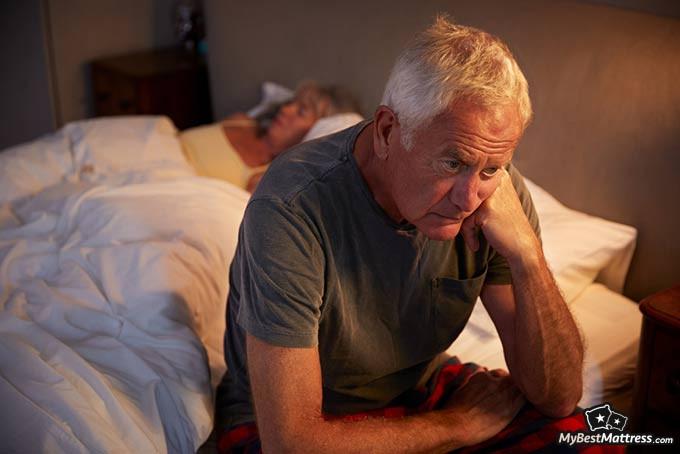
While the majority of seniors experience insomnia in the elderly, many individuals go through excessive sleep, especially daytime sleepiness. Let’s take a look into both of them.
Insomnia in Elderly
Insomnia is one of the most common sleep disorders experienced not only in the elderly but also by young people. The research[4] that was carried out in 2018 shows that 205 million people aged 60 years or older experience insomnia. And this number keeps growing. This problem is often associated with the disruption of the sleep cycle in the elderly.
Latest Saatva Coupon Found:
UP TO $500 OFF
Limited-time Saatva Sale
We're sharing a limited-time Saatva mattress discount with our readers! Grab this deal & enjoy your new mattress with huge discounts.
Excessive Sleep in Elderly
It is known that excessive daytime sleepiness[5] is often experienced in the elderly. This problem is associated with sleepiness, lack of concentration, and drowsiness during the day. It’s especially dangerous for seniors who move a lot and drive a car because excessive sleep in elderly can cause fallings and car accidents. So, it’s essential to be careful; if you feel dizziness or sleepiness never drive a car.
Therefore, the main problems that are associated with aging and sleep are insomnia and excessive sleep. The majority of seniors find it difficult to fall asleep, have several awakenings during the night, and wake up early in the morning; however, due to these problems, they also experience excessive daytime sleepiness.
Can Prescription Medication Change Sleep Habits in the Elderly?
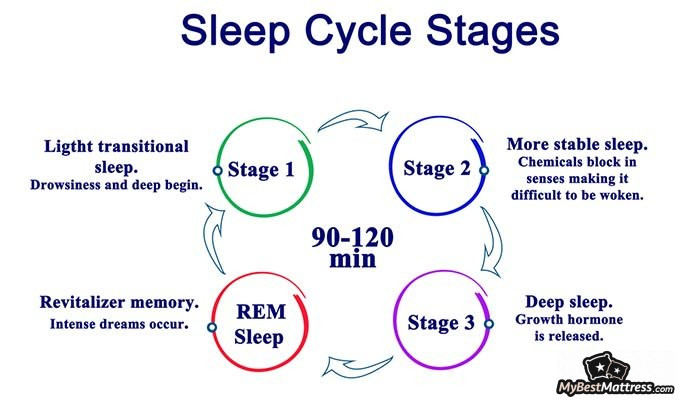
When it comes to aging and sleep, it’s already known that the elderly find it difficult to fall asleep at times. The majority of them take sleep medications in order to get that needed rest.
Therefore, aging and sleep are widely related to the medication. It’s not a secret that seniors often take prescription medication to sleep better or get some sleep at all. However, the minority of people speak about the negative impact sleeping pills have on health.
While medication might seem the easiest way, you should know that it’s not the best option. Prescribed medication does not treat insomnia in elderly, but there are a few more aspects that you should consider.
First of all, even if the sleeping medication seems like the only thing that works, after using them for a long time, they become not as effective or shortly said, you get used to them. So, every time you want to fall asleep, you think about the need for medication, which means you no longer try to sleep naturally.
Secondly, similar to other medications, sleeping pills have side effects. The most crucial one is the lack of concentration, which can create many accidents, such as falling during the day and even car disasters. You may have noticed that many vehicle incidents are caused by the seniors 65+ years.
Furthermore, sleeping pills can have such side effects as changes in your appetite, dizziness, dryness in mouth and throat, lower blood pressure[6], diarrhea and burning or tingling in legs, feet, hands or arms.
Therefore, there are so many side effects that can be caused by sleeping pills, so before using any medication, talk to your doctor, he will introduce you with potential side effects and other possible threats you should be aware of.
But despite the fact that you’re using any medication at the moment or planning to, you can try a few sleep aids for elderly, which I provided in the further section. It may help you to avoid the usage of any drugs, so why not consider them?
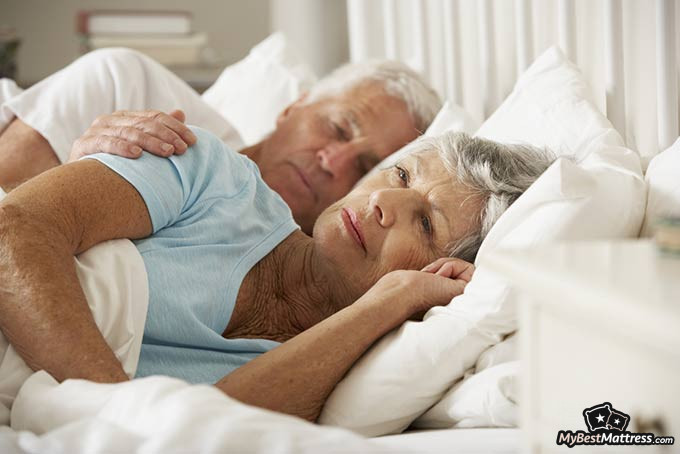
Aging and Sleep: Sleep Aids for Elderly
As I told you already, I want to introduce some sleeping tips, which may be not only helpful for elderly but also for young people and adults who are suffering from insomnia.
Here they are.

Did you know?
Have you ever wondered which mattresses are approved as the best for sleep?
See & compare TOP mattresses side by sideFind the Comfortable Mattress
Majority of people think about aging and sleep problems as an inevitable process, but why not make this time less stressful and more comfortable? Finding the right mattress should improve the sleep quality of older people as beds nowadays have such qualities as pain and pressure relief, perfect conforming.
Therefore, the quality mattress would be not only comfortable but also beneficial to people who have seizures or pains due to old age. It could have a major impact on your sleep.
Now, since I told you that a new mattress can be one of the most effective sleep aids for elderly, let me introduce you to the mattress types and provide you with some options. Here are the most common mattress designs you can choose from:
- Memory foam mattress - for those who need perfect comfort and body conforming. These mattresses are one of the most popular options in the market as they tend to be inexpensive, serve you for at least seven years, and provide you with pain and pressure relief.
- Innerspring mattress - for those who are looking for support. Due to the airflow in the coils, these mattresses manage to maintain the neutral body temperature throughout the night. So, innerspring mattresses are also great for hot sleepers.
- Latex mattress - adapts to your body, similar to the memory foam mattress. They’re best known for durability and comfort. Latex mattresses also offer amazing conforming, and they are more bouncy than foam mattresses.
Of course, there are even more options in the market, but these mattresses are known to be the most comfortable ones, especially for older people, who need to get quality sleep.
Create Your Sleeping Routine

While creating your sleeping routine may not sound like an effective way to improve your sleep, you would be surprised how amazing it works. Here are a few things you can try:
- Exercise. Activities can help to improve your sleep and provide you with a number of other benefits. Note that I’m not speaking about complicated exercises, even walking outside can help you.
- Fewer naps. Make sure you’re not taking a lot of naps. Even people who are not suffering from insomnia find it more difficult to fall asleep during the night if they take even a short nap. But if you feel tired and know that it’s impossible to wait the entire day, then try to take a nap before 3 p.m for less than an hour.
- Before-bed routine. While preparing to go to bed, try to repeat the same steps every day, such as reading a book, listening to calm music or meditating. This way you will signalize to the brain that it’s time to go to sleep.
- Stay healthy. Try to eat clean and minimize your caffeine and alcohol intake. It’s not only beneficial for your health but also improve the quality of your sleep.
- No TV in bed. The bed should be associated with sleep, but when you watch TV, eat and sleep in the same place, your brain can create other associations, which will distract you from sleeping.
- Go to sleep and wake up at the same time. It might sound difficult, however, when you create routine, your brain gets used to specific actions at the same. So, when it’s time for sleep, your brain will be prepared. Note that these tips are great not only for insomnia in elderly but also for younger individuals.
Conclusions
So, sleep in elderly, what is normal? By now, you already know that seniors experience sleeping disorders quite often. Majority of them find a hard time falling asleep as well as feel sleepy during the day.
The main reason why older people experience insomnia is the changes in their circadian rhythm, which can change the sleep-wake cycles. So, older people wake up more times during the night and experience less deep sleep than younger individuals. They’re also affected by medication, which can change sleeping habits and become the only way to get quality sleep.
However, the elderly have other options, which do not include medication, such as finding the most comfortable mattress, creating a sleeping routine and staying healthy. This way, there’s a chance to avoid drugs.
Therefore, as promised, I explained everything there is to know about aging and sleep, insomnia and excessive sleep and many other aspects that are relevant to seniors. So, if you’re suffering from similar issues, you already know, which actions should be taken.
Contributed By Katie Letourneau, Adult & Pediatric Sleep Consultant
As an adult and pediatric sleep consultant, Katie works collaboratively with adults who are struggling with sleep challenges and families whose babies and children's sleep issues significantly impa...
Read Full Bio...Scientific References
Contributed by Katie Letourneau, Adult & Pediatric Sleep Consultant1. Jean-Philippe Chaput, Caroline Dutil, and Hugues Sampasa-Kanyinga: 'Sleeping hours: what is the ideal number and how does age impact this?'
2. Jana R. Cooke and Sonia Ancoli-Israel: 'Normal and Abnormal Sleep in the Elderly'
3. Bryce A. Mander, Joseph R. Winer, and Matthew P. Walker: 'Sleep and Human Aging'
4. Dhaval Patel, Joel Steinberg, and Pragnesh Patel: 'Insomnia in the Elderly: A Review'
5. Isabelle Jaussent, Jean Bouyer, Marie-Laure Ancelin, et al.:'Excessive Sleepiness is Predictive of Cognitive Decline in the Elderly'
6. Nobuo Sasaki, Saeko Fujiwara, Ryoji Ozono, et al.: 'Lower blood pressure and smaller pulse pressure in sleeping pill users'
Leave your honest feedback
Leave your genuine opinion & help thousands of people to choose the best mattress. All feedback, either positive or negative, are accepted as long as they’re honest. We do not publish biased feedback or spam. So if you want to share your experience, opinion or give advice - the scene is yours!



